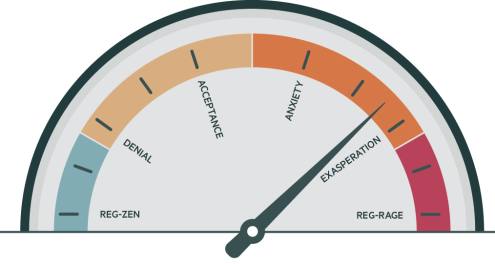At a glance
- The US FSOC issued updated guidance that will allow the council to more comfortably designate NBFIs as systemically important
- While it is a live issue in the US, designating shadow banks as systemically important echoes old debates
- Jurisdictions and regulatory bodies are trying to regulate the non-bank sector by focusing on specific activities such as leverage or liquidity
As non-bank financial institutions keep growing, now accounting for almost half of global financial assets, regulators are still grappling with the best way to tame the risks they pose to financial stability.
Last November, the US Financial Stability Oversight Council issued updated guidance that will allow the council to more comfortably designate systemically important financial institutions, mirroring what currently happens with banks.
While with the 2010 Dodd-Frank Act, the US Congress had already given FSOC the authority to designate systemically important NBFIs, in the past decade the possibility has been undermined by industry resistance, lawsuits and Donald Trump’s presidency.
In 2012, the FSOC first issued guidance concerning its designation power and continued to designate four non-banks as systemically important, including insurer MetLife, which then legally challenged the body’s decision. By 2018, the FSOC had rescinded all four of its designations and proceeded to substantially revise its guidance in a way that made it nearly impossible to designate any entity as systemically important.
To proceed with the designation, “both the Commodity Futures Trading Commission and the SEC [Securities and Exchange Commission] needed to agree, and a cost-benefit analysis had to be carried to show with unequivocal clarity that regulating such entity is better than not regulating”, says Matthias Thiemann, professor at Sciences Po Paris and author of The Growth of Shadow Banking.
“Showing something unequivocally is very difficult. Every lawyer [of a designated NBFI] could immediately say ‘we want to challenge the decision’,” adds Thiemann.
Moreover, under the Trump presidency, from 2017 to 2021, when Steven Mnuchin was Treasury secretary and FSOC chair, the FSOC’s funding and staffing was slashed, undermining the powers of an entity that had been explicitly created to mitigate risks to US financial stability following the 2008-09 global financial crisis.
Now, Thiemann says that “hedge funds are scared because the threat of the designation as systemically important is back on the table”, referring to the increased compliance that Federal Reserve supervision and prudential standards entail for SIFIs.
However, designation as a SIFI is not a panacea for financial stability and the FSOC stresses that its latest guidance does not substitute an “activity-based approach” to address risks to financial stability — it is just another tool in its toolbox.
Regulatory arbitrage?
The growth of so-called shadow banking has been facilitated by regulatory arbitrage between banks and non-banks, with the latter proliferating after tightening regulation of banks following the global financial crisis.
As a result, financial activity, including lending, has migrated to the less regulated non-bank area.
Not everybody supports this narrative, however. During a conference organised by the Goethe University's Institute for Law and Finance in January, Barbara Novick, co-founder and former vice chair at BlackRock, the world's largest asset manager and an organisation that is considered one of the biggest NBFIs, said: “I wouldn’t call it regulatory arbitrage. I would call it a different regulatory regime than the banking regime.”
Specifically referring to private debt, a growing part of the NBFI area, Novick suggested that the introduction of a wider set of lenders is actually positive for financial stability. “The diversity is good, especially when the lenders have the ability to hold the loans to maturity. None of these non-banks have deposit insurance or access to any government guarantees. So the non-bank lenders in the private credit market are making investments and they’re bearing the risk of the loss,” she added.
The hesitance to regulate NBFIs as banks, or at least to create a list of systemically important institutions, stems from the argument that while banking regulation derives from the need to protect those who are in a weaker position (retail depositors and customers), NBFIs serve more sophisticated investors, whose losses are considered less protection-worthy.
However, recent crises have shown how much the fragility of the sector could reverberate around the markets and prompt funding intervention from public administrations.
“NBFI direct access to central bank liquidity could prove necessary in times of stress,” reads a 2023 IMF report, explicitly suggesting access to public resources, which is the moral hazard that bank regulators worldwide have been trying to move away from (as evident in the debate about bailing out banks and bank resolution schemes).
More on shadow banking
Developments outside the US
While it is a live issue in the US, talking about designating shadow banks as systemically important seems to echo old debates.
Back in 2014, the Financial Stability Board and the International Organization of Securities Commissions discussed extending the framework for global systemically important banks to NBFIs. Those discussions have not progressed in the last few years.
Regulators have come to realise that the distinct characteristics of non-banks mean that they cannot be treated the same as banks, and instead need a more nuanced approach. This is especially true because, while banks have the same general characteristics, NBFIs comprise different entities such as money market funds, investment funds, hedge funds and private equity funds, among others.
Indeed, specific jurisdictions and regulatory bodies are trying to regulate the non-banking area by focusing on specific activities carried out by NBFIs such as leverage or liquidity.
Different jurisdictions may also have more or less incentive to regulate the sector based on the individual characteristics of their financial systems.
Regulators in the EU are concerned and have been discussing the risks posed by NBFIs, but less than in the US, notes Lucia Quaglia, professor at University of Bologna and author of “The Perils of International Regime Complexity in Shadow Banking”.
She says: “The EU still has a bank-centric financial system as the NBFI is a smaller part of the overall financial system than in other jurisdictions. The debate on the designation of SIFI/NBFI is less important in the EU than in the US, where the designation would subject a NBFI to Fed supervision and enhanced prudential requirements. That is not the case in the EU.”
Indeed, the European Systemic Risk Board does not have the same competences and powers to regulate financial institutions of the FSOC.
Will other jurisdictions follow the US?
“The politics of it is basically that if the US pushes through such an important regulatory decision, the rest of the world will follow,” suggests Thiemann.
It remains to be seen how far the US regulator is currently considering following through and actually designating specific NBFIs as systemically important, or rather “using this tool to convince certain NBFIs to agree to other pending regulations”, concludes Thiemann.













